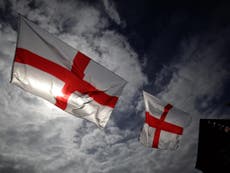Domestic abuse soars by almost 50% after England win World Cup matches, study finds
‘For many existing victims, these tournaments create a period of more intense control and fear from their partners, exacerbating an already existing problem,’ campaigner warns

Your support helps us to tell the story
From reproductive rights to climate change to Big Tech, The Independent is on the ground when the story is developing. Whether it's investigating the financials of Elon Musk's pro-Trump PAC or producing our latest documentary, 'The A Word', which shines a light on the American women fighting for reproductive rights, we know how important it is to parse out the facts from the messaging.
At such a critical moment in US history, we need reporters on the ground. Your donation allows us to keep sending journalists to speak to both sides of the story.
The Independent is trusted by Americans across the entire political spectrum. And unlike many other quality news outlets, we choose not to lock Americans out of our reporting and analysis with paywalls. We believe quality journalism should be available to everyone, paid for by those who can afford it.
Your support makes all the difference.Domestic abuse soars by nearly 50 per cent after the England men’s football team win a World Cup game, according to a new study.
Researchers at Warwick Business School discovered abuse and violence by partners increased by 47 per cent on the day England won a World Cup or European Championship match.
The study found domestic abuse remained higher than average on the day after a tournament win, with reports of cases involving alcohol 18 per cent higher than average.
Domestic abuse organisations frequently warn that while neither alcohol nor the World Cup create or excuse domestic abuse, they can exacerbate pre-existing patterns and provide perpetrators with an opportunity to ramp up mistreatment.
Researchers, whose findings were published in Social Science and Medicine, analysed a decade of crime statistics from West Midlands Police stretching from 2010 to 2019.
Anna Trendl, a researcher at Warwick Business School, said: “It is important to recognise that for victims, domestic abuse does not occur once every two or four years following a football match. It is a lived experience of constant fear.
“However, our results provide a deeper understanding of the environments that could increase the likelihood of that manifesting itself in alcohol-related abuse.
“These football tournaments are often characterised with high levels of optimism, expectation, and yearning for the glory of England’s victory at the 1966 World Cup.”
Dr Trendi said that meant an England win can have a substantial impact on fans’ alcohol consumption during nationwide celebrations after a match, which raises the chance of domestic abuse.
“We found no evidence for alternative explanations, such as increased policing on match days leading to higher detection rates, or awareness campaigns before a tournament leading to higher rates of reported domestic abuse,” she added.
Researchers found the increase in reports of domestic abuse started in the three-hour period covering the build-up and the England game itself, before "peaking" in the three hours after the match.
The rise in reported incidents predominantly involved cases of violence and abuse perpetrated by a man against a woman.
Elaine Yates, chief executive of Coventry Haven Women’s Aid, said: “It is well known that incidences of abuse and violence increase when teams lose, but there are also more reported incidences when they win.
“For many existing victims, these tournaments create a period of more intense control and fear from their partners, exacerbating an already existing problem.”
She said they were especially worried this year as the spiralling cost of living crisis was keeping victims trapped living with abusers because they cannot afford to flee.
It is well known that incidences of abuse and violence increase when teams lose, but there are also more reported incidences when they win.
Ms Yates: “Add to this that year on year our organisation also sees that many women choose not to leave over the festive period ‘for the sake of their children'. All of these factors make for a perfect storm.”
It comes after The Independent reported on concerns that incidents of domestic abuse will increase during the World Cup as fresh data showed a surge in inquiries about children enduring violence at home in the last tournament.
The National Society for the Prevention of Cruelty to Children (NSPCC) issued the warning after research found that domestic abuse calls to the charity’s helpline soared by a third more than the monthly average during the 2018 World Cup.
Anyone who requires help or support can contact the National Domestic Abuse Helpline which is open 24/7 365 days per year on 0808 2000 247 or via their website nationaldahelpline.org.uk


Join our commenting forum
Join thought-provoking conversations, follow other Independent readers and see their replies
Comments